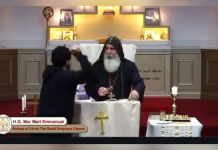In a recent opinion piece, Matthew Anstey provided an account of the recent debate in the General Synod of the Anglican Church of Australia over the meaning of marriage. While this piece largely elaborated the Archbishop of Brisbane’s recent letter to his clergy, it contained such egregious errors of fact and attribution of motive that it calls for a response.
At the General Synod last month, two statements were presented formally at the request of the Diocese of Sydney, though both those statements had been extensively workshopped with members of the synod outside of Sydney — laypeople, clergy, and bishops, women and men, same-sex attracted people and other-sex attracted people. Their final form was greatly improved by this extensive interaction. Both of these statements were reaffirmations of a determination to live according to the teaching of Christ as it is given to us in the Bible.
When each statement was put to the vote, the vote was taken in houses (laity, clergy, bishops). This is an entirely legitimate procedure. There are obvious disadvantages of such a procedure, since it means that the measure must pass in each of the three houses in order to pass overall. There are also very obvious advantages, particularly since the order of voting ensures that laity or clergy are free to vote prior to, and therefore without direction from, the bishops.
In the case of the first statement, specifically affirming the biblical teaching about marriage, the house of laity approved the statement (63/47) as did the house of clergy (70/39), but the house of bishops (which only contains the presiding bishop in each diocese, not every bishop of a diocese) narrowly voted to reject the statement (12/10 with 2 abstentions). This created consternation among many since the synod as a whole had voted so very clearly in support of it (without the bishops 133/86). The twelve bishops who voted against the statement had declined to listen to a very clear majority of the synod.
The second statement, affirming the meaning of the term “unchastity” and itself containing a sentence about marriage that included “defined in the Book of Common Prayer as the union of one man and one woman, in accordance with Jesus’ teaching about marriage in Matt. 19:4–5”, received almost identical support in the house of laity (62/48) and the house of clergy (69/39) but this time the house of bishops also approved the statement (12/11).
Later in the synod, an attempt was made to pass a motion supporting same-sex marriage. That vote was not taken by houses, and the motion was defeated (95/145). Various other motions were on the agenda papers, but were subsequently withdrawn. A petition signed by more than half of the General Synod expressed regret that the House of Bishops had failed to affirm the teaching of Christ on marriage.
There was clearly a great deal emotion surrounding these debates in the General Synod, and much of that continues. It is neither helpful nor accurate to cast the debate in terms of broad, comprehensive, open-hearted progressives, on the one hand, versus narrow, exclusive, hegemonic conservatives on the other. LGBTIQA+ people are represented on both sides of the debate. One person’s progressive is another’s revisionist; one person’s conservative is another person’s orthodox. Anstey contends that twelve bishops who voted against the first statement displayed a commitment to a “leadership of listening”. Others would disagree and offer instead that it is evidence of failure to listen.
While it is right for bishops to listen to a diversity of voices — and especially, at this moment, to those of LGBTQIA+ persons and their allies — the most important voice for them to listen to is that of Jesus Christ. Bishops of the Anglican Church are entrusted with the task of being guardians of the faith, and have a particular responsibility to ensure that the teachings of Christ recorded for us in the Scriptures are gladly embraced and upheld in the ministry and life of the church.
Anstey’s piece expresses his own strong disagreement — and that of Archbishop Aspinall — with the Diocese of Sydney on this issue and others. Sadly, it also caricatures statements made by Sydney’s previous Archbishop — addressed to those leaders who have taken vows to uphold the teaching of the church but instead wish to change it — and the motives of those, from Sydney and elsewhere, who moved these statements. This was never an attempt to define the church’s view of marriage, but rather to affirm what is and has always been the Bible’s teaching on marriage.
Perhaps one of the remarkable features of Anstey’s piece is the claim that there was an attempt to silence 40 per cent of General Synod. First, this was not the case. The arguments of those who opposed the statement and who promoted the later motion were heard with respect and grace. Second, it makes no reference at all to the more than 60 per cent whom Anstey wishes to label as unrepresentative and hard-line. One person’s 40 per cent against is another person’s 60 per cent for, I guess.
The truth is that a great deal of listening was done at this General Synod. There were wonderfully helpful conversations shared by people with a wide spectrum of opinion. It was heartening to see people from very different background eating together, talking together, and praying together.
What is more, a great deal of good was done in other areas, including very positive action on child protection, the prevention of domestic violence, and climate change. While the sexuality debates attracted considerable attention, they were far from the only thing discussed at this General Synod.
This General Synod was remarkable for one other thing. It brought to light the remarkable work God is doing among Anglicans across the country. Anglicans with a vision for reaching the nation with the message of salvation, hope and life in Jesus Christ — Anglicans from every diocese in the national church — are joining together. Joyful in the grace they have received and wish to share with others, confident in the teaching of Christ given to us in the Bible, prayerfully dependent upon our heavenly Father, led by the Spirit as they live as disciples of Christ, they see the future as full of opportunity.
The shape of Anglicanism across the country is changing, and I believe that is a very good thing.
The Rev. Canon Dr Mark Thompson is Principal of Moore Theological College.










